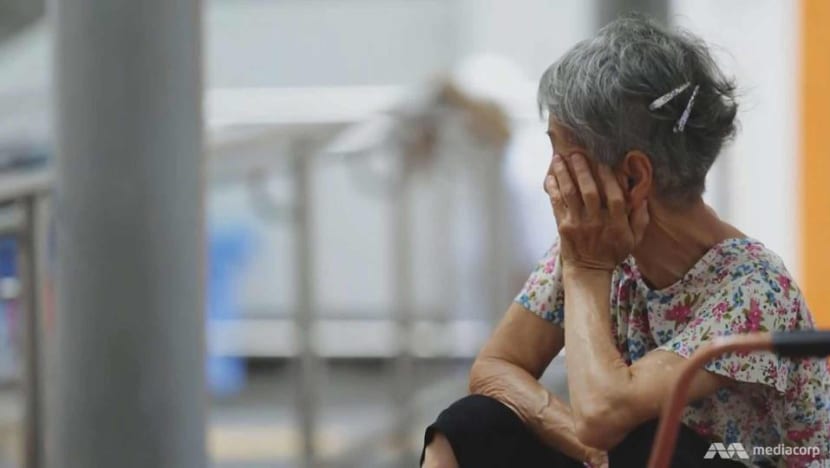The ‘invisible problem’ of family violence: Older women who suffer in silence
The number of Personal Protection Orders filed by women above the age of 50 has remained relatively stable over the years, but it is likely that there are many who suffer in silence.

About four in 10 of those surveyed saw family violence as a private matter.
SINGAPORE: For more than 10 years, 56-year-old Mandy* endured insults and vulgarities being hurled at her almost every day, by a man she loved. Her husband, who had been in and out of prison for drug offences, also asked her for money regularly to feed his habit.
“He threatened to ‘not let me go’ and to ‘slowly torture me if he has the chance’ if I reported him to the Central Narcotics Bureau (CNB),” said Mandy, who works as a cleaner. Things came to a head in June last year, when she was leaving for work in the wee hours of the morning and he asked her for money again.
“I replied that I had no money to give him,” she said. “I was leaving for work and was about to open the door, when he hit me on the back with his fist.”
AN INVISIBLE PROBLEM
Mandy is part of a group of older women that appears to be growing in number: Those facing physical or verbal abuse from a loved one.
The issue was first raised in Parliament in October by MP for Nee Soon GRC Lee Bee Wah, who filed a parliamentary question. “In May and June this year, I met up with three VWOs (voluntary welfare organisations) serving my residents to ask if there is anything I can do to help,” she said. “All three told me they see an increase in family violence for women above 50.”
“Any woman suffering from domestic violence is one too many, so I spoke about it in Parliament.”
In response to Dr Lee’s question, Minister for Social and Family Development Desmond Lee noted that the number of applications for Personal Protection Orders (PPOs) made by women above the age of 50 has remained relatively stable over the last three years. But he also described the issue as an “invisible problem”, pointing out that 40 per cent of people his ministry surveyed last year feared reporting family violence as they felt it was a private matter.
The law defines family violence as causing hurt, confining, restraining or harassing a family member, and placing or attempting to place them in fear of hurt. But AWARE’s head of advocacy and research Jolene Tan noted that family violence does not only take the form of bruises and broken bones.
“It can be physical, verbal, psychological, emotional or sexual,” she said. “Because of harmful gender stereotypes, men are more likely to exercise economic and social power over women in their families, which perpetuates situations of family violence.”
And according to those Channel NewsAsia spoke to, instances of family violence often go under-reported, particularly when it comes to older women.
Cases of domestic violence form the second-highest number out of all the cases seen at the Singapore Children’s Society’s Yishun Family Service Centre. And Goh Si Yong, a senior social worker with the centre, estimates that the number is even higher.
“The numbers that we have on hand are those who reported family violence as their presenting issue when they come in,” she said. “But when we talk to the other cases when the presenting issue has to do with finances or parenting, we realised that when we dig further, there is family violence as well.”
It is likely that a significant number go unreported.
“Statistics show that the population in Singapore is greying, but the figures (for cases of violence against older women) are about the same,” added Ms Goh. “So we concluded that it could be under-reported, and the elderly are not coming forward.”
WATCH: The issue as tackled on the programme Talking Point (1:40)
OLDER WOMEN LESS LIKELY TO COME FORWARD
AWARE’s Ms Tan noted that not everyone is willing or able to file a police report or a PPO. “Many examples we see of violence against older women reflected continued abusive behaviour by perpetrators that has taken place over a long period of time,” she said.
“Older women are more physically vulnerable, and tend to rely more on others – including, at times, their abusers – for their financial well-being, care, health and safety,” she said. “Abusers may also deny them medication or healthcare visits, which can put their lives at risk.”
“Many examples we see of violence against older women reflected continued abusive behaviour by perpetrators that has taken place over a long period of time,” she added.
Ms Goh also pointed out that in cases of family violence involving older women, the perpetrator of violence may also be the woman’s son.
“They will consider things like what other family members will think, and will be very mindful about what the implications will be if they apply for a PPO against their son,” she said. “And they may give more thought to their son’s well-being, and if the PPO will affect their son’s future.”
She added that there could also be a language barrier for older women, or they could be fearful of authority. “If the police come, but the other party is more eloquent, then they are worried that the police might not believe them,” she said. “And then they may get scolded.”
Indeed, while Mandy sought help at the Singapore Children’s Society shortly after her husband hit her, it took almost a year for her to report him to the CNB for drug abuse. “I felt guilty for reporting my own husband, and feared that he would know, and bear a grudge towards me,” she said.
And her fears were not unfounded: When her husband was released on self-bail after she reported him, she was scolded, harassed and threatened daily. As a result, she had to move out and stay at a backpacker hostel until he had to return to the CNB.
SPOTTING THE SIGNS
Given the reluctance of victims to come forward, it is therefore important that friends and relatives learn to spot the signs and offer them support and assistance. “Public education on the reality of family violence needs to be implemented more widely,” said Ms Tan. “Once we acknowledge that domestic violence is not just physical, we see that it is a common occurrence that is largely tolerated or excused.”
Victims, she said, may sometimes express unwillingness to return home or see their perpetrator. They may also be socially isolated or forced to ask for permission before meeting others or going somewhere.
Physical signs like bruise marks may also be evident, said Ms Goh. “They come in with bruises or signs of hurt on their face or on their body, and sometimes, they look very fearful, and their whole body will be curled up.”
Her advice to friends and family is to ask after their well-being in a non-judgmental, non-intrusive way.
“They could say things like, ‘it seems to me that you look quite down recently, and are you going through something?’ So check in and give her some space to talk about it,” she said. “Just be there to offer assistance and to be present, and give them a listening ear.
“If she’s not ready to talk about it, they can also offer to accompany her to seek help or visit a doctor,” she added.
Today, Mandy’s husband is still in remand at CNB. While she says she is disappointed in him for going back to drugs time and again, and his threats and words towards her and her now 29-year-old son, she is still hopeful he can change for the better.
But she does not regret speaking up.
“I want to share my story so that women will not suffer abuse in silence, and not feel that it is a shameful thing,” she said. “Don’t defend or make a reason for your husband as it’s wrong and will only bring harm to yourself or your children.
“Think of your children.”
*Not her real name














